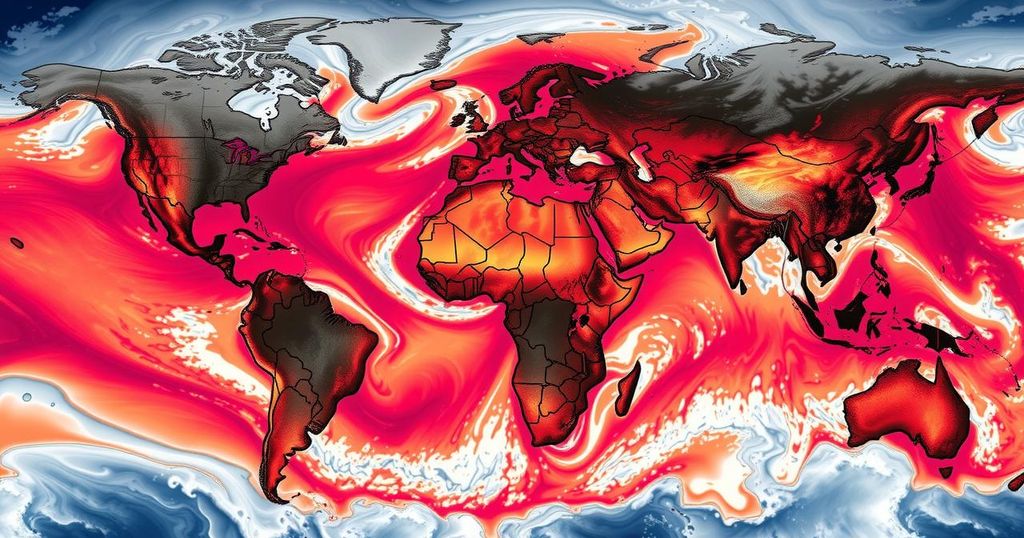2024 Marks Earth’s Hottest Year, Surpassing Critical Climate Threshold

In 2024, Earth experienced its hottest year on record, surpassing the critical 1.5 degrees Celsius threshold. This phenomenon is largely due to greenhouse gas emissions from burning fossil fuels. Experts warn of escalating climate-related disasters and economic costs brought about by these unprecedented temperatures. The record temperatures highlight a pressing need for immediate climate action to mitigate further warming and its dire consequences.
Earth has officially recorded its hottest year ever in 2024, surpassing previous temperatures by a significant margin, as multiple weather monitoring organizations reported on Friday. The global average temperature has exceeded the critical 1.5 degrees Celsius threshold established by the 2015 Paris climate agreement. Various agencies, including the European Commission’s Copernicus Climate Service, Japan’s weather agency, and the United Kingdom’s Meteorology Office, provided varying but alarming data, indicating warming of between 1.53 to 1.6 degrees Celsius. American agencies like NASA and the National Oceanic and Atmospheric Administration are expected to confirm this trend in their forthcoming reports.
The remarkable rise in average annual temperatures is attributed primarily to the ongoing accumulation of greenhouse gases from fossil fuel combustion. Samantha Burgess, the Strategic Climate Lead at Copernicus, emphasized the link between this accumulation and the resultant increase in ocean temperatures, rising sea levels, and depleting glaciers and ice sheets. Moreover, last year’s temperature not only eclipsed that of 2023 but also represented an unusually large rise in global temperature, which typically varies by mere hundredths of a degree in prior record years. The last decade has consistently ranked as the hottest in recorded history, with indications suggesting this might also be the warmest period in approximately 125,000 years.
July 10 marked the hottest day ever documented, with an average global temperature of 17.16 degrees Celsius. Scientists noted that the principal drivers of these extreme temperature increases are fossil fuel emissions, with natural phenomena like the El Nino effect contributing minimally. The alarming rise in global temperatures is resulting in devastating climatic phenomena, noted by meteorology experts. Marshall Shepherd from the University of Georgia likened the current climate situation to a warning light on a dashboard, signifying an urgent need for action amid various weather-related disasters.
The overall economic toll from climate-related disasters reached $140 billion last year, with North America facing substantial losses. Experts argue that the continuing rise in temperatures will exacerbate damage to infrastructure and pose serious risks to public health, as stated by University of Arizona water scientist Kathy Jacobs.
For the first time in the records, a single year has surpassed the 1.5-degree threshold, though it is important to note that this measurement is an anomaly, with many scientists reiterating that the long-term average remains at 1.3 degrees Celsius. Victor Gensini from Northern Illinois University highlighted the significance of the 1.5-degree mark as a crucial indicator of climate stability.
Looking ahead, projections reveal that while 2025 may be slightly cooler due to different climatic conditions, concerns about accelerating temperature rise continue to linger among scientists. Carlo Buontempo, director of Copernicus, pointed out a discrepancy between atmospheric warming and the rapidly increasing heat content of the oceans. Finally, regarding the overall climate threat, Michael Mann from the University of Pennsylvania warned that society remains ill-prepared for the impending climatic challenges, drawing a grim comparison to dystopian narratives in fiction.
The alarming rise in global temperatures, confirmed by various meteorological agencies, indicates a potential climate crisis stemming from human activities, particularly through the burning of fossil fuels. The surpassing of the 1.5 degrees Celsius threshold, as outlined in the Paris Agreement, underscores the urgent need for effective climate action. Climate anomalies resulting in extreme weather patterns, economic losses, and environmental degradation highlight the severity of this situation. The data spans a considerable timeline, revealing trends that could suggest an unprecedented climatic shift that events in the future may aggravate.
In conclusion, the record-breaking temperature of 2024 serves as a stark reminder of the urgent climate crisis currently confronting the globe. With significant elevation past the 1.5-degree Celsius threshold, it becomes critically clear that immediate and concerted actions are necessary to avert further environmental damage. As expert opinions emphasize the importance of addressing this growing threat, society must recognize and respond to the warning signs of a looming climatic catastrophe.
Original Source: kbindependent.org







